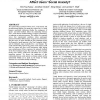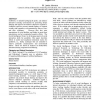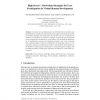283 search results - page 11 / 57 » Modelling socially intelligent virtual humans |
ATAL
2003
Springer
14 years 1 months ago
2003
Springer
This article builds on insights into how humans cope with emotion to guide the design of virtual humans. Although coping is increasingly viewed in the psychological literature as ...
ATAL
2008
Springer
13 years 10 months ago
2008
Springer
We explored the association between users' social anxiety and the interactional fidelity of an agent (also referred to as a virtual human), specifically addressing whether th...
IUI
2003
ACM
14 years 1 months ago
2003
ACM
Guidebots, or animated pedagogical agents, can enhance interactive learning environments by promoting deeper learning and improve the learner's subjective experience. Guidebo...
ATAL
2006
Springer
14 years 13 days ago
2006
Springer
Intelligent agents are typically situated in a social environment and must reason about social cause and effect. Such reasoning is qualitatively different from physical causal rea...
IVA
2010
Springer
13 years 7 months ago
2010
Springer
Conversational modeling requires an extended time commitment, and the difficulty associated with capturing the wide range of conversational stimuli necessitates extended user parti...



